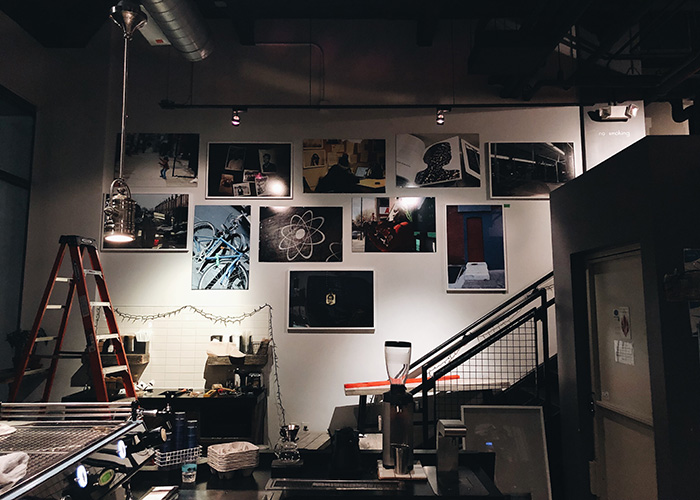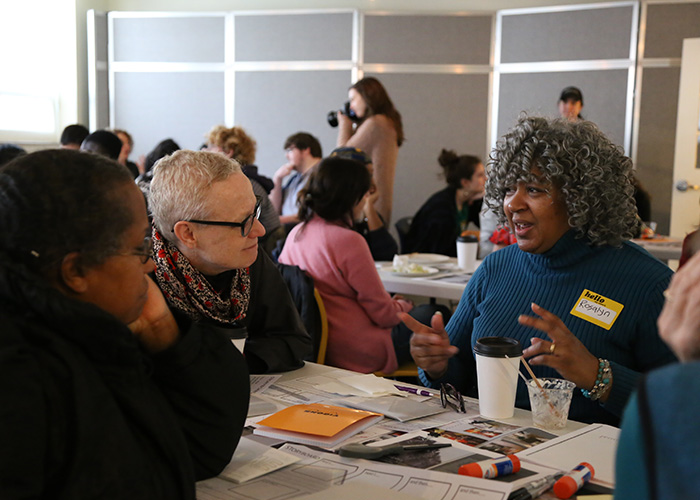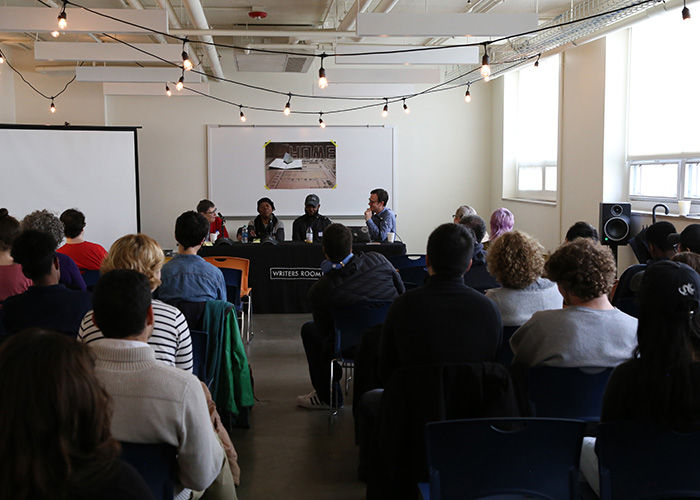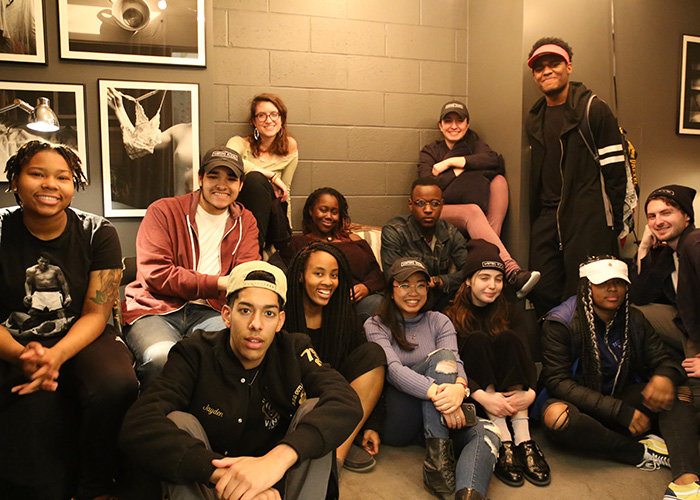What’s New with Writers Room? Three Things to Know
By Kylie Gray
April 2, 2019
Writers Room, a university-community literary arts program, has taken its creative placemaking, social justice and civic engagement in new directions in recent months. Find out what Writers Room has been up to — and how you can get involved.
1. It's deepening community connections.
 Installing the new Canon TRIPOD show at Joe Coffee in University City. Photo by Lauren Lowe.
Installing the new Canon TRIPOD show at Joe Coffee in University City. Photo by Lauren Lowe.
If you’ve popped into Joe Coffee recently, you’ve likely noticed the new photo installation scaling its walls. The photographs are one result of Canon TRIPOD — a yearlong project that depicts the West Philadelphia experience through writing and photography. In partnership with Canon Solutions America, Writers Room brings together intergenerational teams from Drexel and the community to tell the story of a changing city.
“The show at Joe is representative of how Writers Room has grown,” says Lauren Lowe ’17, who helped facilitate the project last year as an ArtistYear AmeriCorps Fellow at Paul Robeson High School. She is currently Writers Room’s first Alumni Writing Fellow. “A few of us used to meet there to talk about the work we’d begun in workshops at the Dornsife Center. Now there are so many people, all with different perspectives, and the photos make that visible.”
This year, the once-pilot program welcomed its second generation of TRIPOD writers-in-residence. Students from Drexel, Paul Robeson and the YouthBuild Philadelphia Charter School are hitting the streets — cameras and pens in hand — with older residents serving as mentors for each triad.
Keep an eye out for their work in the next issue of Anthology, to be published later this spring.
2. It’s exploring the concept of home — in a tangible way.
 A conversation at the HOME Symposium: Healthy Living Forum. Photo by Devin Welsh.
A conversation at the HOME Symposium: Healthy Living Forum. Photo by Devin Welsh.
Writers Room’s collaborations with community members have revealed challenges and opportunities in a neighborhood that has grappled with the effects of gentrification and displacement.
In January, Writers Room and the School of Education embarked on a two-year, community-led participatory action research study tackling just that. The project, “Anti-Displacement: The Untapped Potential of University-Community Cooperative Living,” was awarded a $160K grant from the Corporation for National and Community Service (CNCS), with partial funding committed by CNCS’ anti-poverty arm, AmeriCorp VISTAS.
One of just 16 funded projects out of 202 applicants nationwide, the project will investigate the landscape of residential displacement in Mantua, current affordable housing options, and how these options are understood by neighbors in need.
The ultimate goal? To create an intergenerational writers house that would provide space for public programming, and catalyze other intergenerational houses nearby — creating a network of homeowners and student tenants whose shared interest in writing and storytelling would form the foundation for meaningful cohabitation.
Ayana Allen-Handy, PhD, an assistant professor in Drexel’s School of Education, will lead the project, while the Canon TRIPOD students will form the core group of researchers. Rachel Wenrick, director of Writers Room, is co-PI, and Kirsten Kaschock, PhD, assistant teaching professor of English, and D.S. Nicholas, RA, AIA, NCARB, an assistant professor in the Westphal College of Media Arts and Design, are senior personnel.
Community leaders Carol Richardson McCullough, advisory committee chair of Writers Room, and De’Wayne Drummond, president of the Mantua Civic Association, will also serve as senior personnel on the project, with YouthBuild Philly teachers George Jenkins and Willa Deitch and education PhD student Shawnna Thomas-El acting as key partners.
“We are truly diverse in identity, background, expertise and thought; yet we have come together to address residential displacement and affordable housing, one of the most important issues plaguing a community which touches many facets of each of our lives,” says Allen-Handy. “We are joint partners in the creation and execution of our research study, and ultimately, in the ways in which it will be shared to support the development of a writers house. Our project exemplifies the transformative nature of interdisciplinary and intergenerational collaboration.”
HOME Symposium
 From the first event in HOME Symposium series, the Neighborhood Histories Roundtable. Photo by Rebecca Arthur.
From the first event in HOME Symposium series, the Neighborhood Histories Roundtable. Photo by Rebecca Arthur.
The research project kicked off with HOME symposium, a series of three public talks and workshops funded by the TD Charitable Foundation. The first two events invited the community to take part in the design process for the potential writers house — first by exploring the history of development in Mantua and Powelton Village, and then by examining the relationship between spaces, healthy habits and creative practices.
The third and final symposium — happening Saturday, April 20 at the Dornsife Center for Neighborhood Partnerships — will focus on cooperative living design and co-living principles that could be applied throughout the homesharing network. Writers Room plans to release a book based on the creative and critical work generated during the symposia’s workshops.
The next phase of the project includes developing the research plan, launching focus groups in the community, and continuing to attend ethical research workshops.
3. It’s making a national impact.
As Writers Room continues to forge ties within our local community, it has also joined national conversations exploring writing and social change. In October, it will join the University of Pennsylvania and Temple University to co-host the third biennial Conference on Community Writing (CCW).
With the theme of “Doing the Work,” the 2019 conference is expected to draw hundreds of participants — academics, students, community partners and activists — who will investigate methods of using writing as a tool for social change, public expression and community building.
Wenrick, a CCW co-chair, says, “With the conference coming to Philly for the first time, this is an opportunity to invite people from all across the country to join us in our work here.”
It’s (still) for everyone — really.
 Writers Room students — from Drexel, YouthBuild Philadelphia and Paul Robeson High School — at the studio in MacAlister. Photo by Rachel Wenrick.
Writers Room students — from Drexel, YouthBuild Philadelphia and Paul Robeson High School — at the studio in MacAlister. Photo by Rachel Wenrick.
One thing that hasn’t changed? Faculty, staff, students in all colleges, local residents and high schoolers, Drexel alums — there is a place for everyone at Writers Room, which made its new home in MacAlister Hall last year.
In addition to its free events — from panels and readings to interactive writing workshops — Writers Room invites the community to use its studio to write, work and gather.
“People often ask, ‘How do I get involved in Writers Room?’” says Wenrick. “You just have to walk in.”
Reflecting its collaborative, cross-disciplinary nature, Writers Room was recently moved from under the Department of English and Philosophy to the College level. Wenrick, who has been Writers Room’s director since founding the program in 2014, was granted a full-time appointment.
“We’re excited to reach more students, more faculty, more neighbors — to connect and do more together,” she says.
For upcoming events and more information, visit Writers Room online.